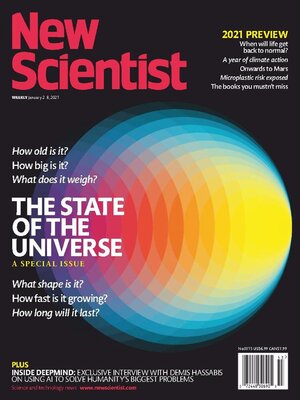New Scientist
magazine ∣ Jan 02 2021 · New Scientist

Sign up to save your library
With an OverDrive account, you can save your favorite libraries for at-a-glance information about availability. Find out more about OverDrive accounts.
Find this title in Libby, the library reading app by OverDrive.



Search for a digital library with this title
Title found at these libraries:
| Library Name | Distance |
|---|---|
| Loading... |
New Scientist covers the latest developments in science and technology that will impact your world. New Scientist employs and commissions the best writers in their fields from all over the world. Our editorial team provide cutting-edge news, award-winning features and reports, written in concise and clear language that puts discoveries and advances in the context of everyday life today and in the future.
Elsewhere on New Scientist
Our big moment • How we reboot the world as the coronavirus pandemic dies down will be critical
New Scientist
Hello 2021 • The coronavirus pandemic and the climate crisis loom large, but there is also hope on the horizon
When will life return to normal? • We start the new year with effective coronavirus vaccines, but the end of the pandemic is still a way off. So what will life be like in 2021, as we glimpse the beginning of the end of the crisis, ask Graham Lawton, Michael Le Page, Donna Lu, Clare Wilson and Adam Vaughan
Unanswered questions
A swarm of spacecraft will arrive at Mars • Three missions to Mars could rewrite our understanding of the Red Planet’s evolution, says Leah Crane
Just how harmful are these tiny pieces of plastic? • Our world is littered with microscopic plastic particles, and we will soon know if they are a health risk, says Layal Liverpool
A big year for climate action • A string of opportunities to confront the climate emergency will come like drumbeats in 2021, says Adam Vaughan
Fatigued by tech • The coronavirus pandemic has had us glued to our devices, but there are easy ways to reach a better balance, says Becca Caddy
#FactsMatter • Are there benefits to a raw-food diet? Eating predominantly uncooked food is a fad that goes way back, but not one we need to follow, writes James Wong
Your letters
Books to save the planet • To give Earth a lifeline, we need to upend many established ideas. Get stuck in for a bumper year of rethinking, say Liz Else and Simon Ings
Sci-fi: 10 top reads for 2021
The best films and TV
Antarctic lines
It’s hard to know what lies ahead 2021 • Whatever happens in 2021, get the clearest possible view with New Scientist
Measuring up the universe • In the past century, cosmologists have created an epic story of an unimaginably vast cosmos that began billions of years ago in a big bang. But can we be sure they have got it right? Stuart Clark audits our cosmological knowledge, providing an essential overview of what we think we know about the universe’s vital statistics – and where there is work still to do
Ladder to the stars • Astronomers estimate the distances from us to celestial objects with a succession of methods called the cosmic distance ladder, so named because each technique relies on the previous one
Curious contours • The cosmos is most likely to be closed and positively curved (top) or open and negatively curved (middle). And yet it seems to be flat (bottom) – or does it?
The other superbugs • Killer viruses and antibiotic-resistant bacteria aren’t the only infectious threats we face – deadly fungi are coming for us too, finds Nic Fleming
“With AI, you might unlock some of the secrets about how life works” • Demis Hassabis is co-founder of DeepMind, a world-leading artificial intelligence company. His team has just cracked one of the hardest problems in biology. That’s just the start, he tells Timothy Revell
The protein problem
A brief history of DeepMind • The company made a name for itself training AI to play video games. Now it is helping diagnose disease and solve intractable scientific problems
The humble spud • Give your potatoes a head start on the growing season with the magic of chitting, says Clare...







